RWU Stay Break Part II: Advocating for the State’s Food Insecure Residents
Students apply their hands-on lessons in food insecurity issues to make an advocacy pitch to state legislators
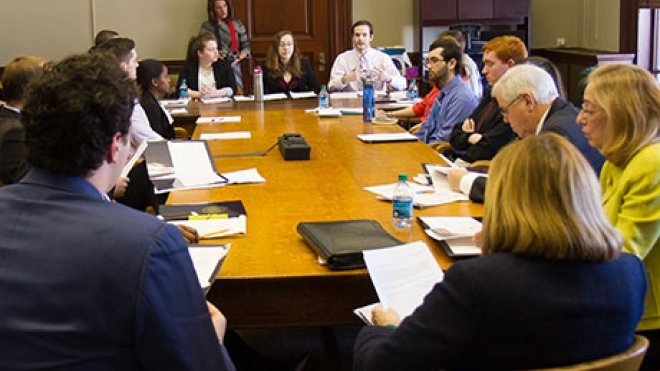
PROVIDENCE, R.I. – Seated across from state lawmakers at the Rhode Island State House on Thursday, a group of Roger Williams University students sounded as polished as seasoned political advocates in pitching their plans to help the hungry.
While it was their first time creating an advocacy brief, the work they’d already put into researching the subject matter, analyzing the issues and conducting hands-on field work enabled them to speak passionately and knowledgeably. The dozen students had traded their spring break for an interdisciplinary, experiential-learning course that exposed them to real families facing the problems of access to food, poverty and homelessness and the Rhode Island agencies and nonprofits that support them.
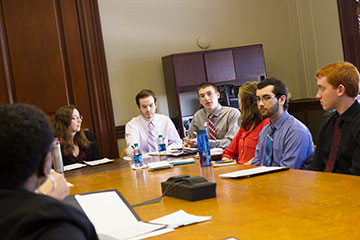 As the capstone project in the “RWU Stay Break: Food Needs in R.I.” course, the students presented their comprehensive case to six state legislators – Rep. Susan Donovan, Rep. Alex Marszalkowski, Rep. Marcia Ranglin-Vassell, Rep. Aaron Regunberg, Rep. Lauren Carson, and Sen. James Seveney, who wanted to hear their ideas on achieving the goals of the governor’s Rhode Island Food Strategy plan.
As the capstone project in the “RWU Stay Break: Food Needs in R.I.” course, the students presented their comprehensive case to six state legislators – Rep. Susan Donovan, Rep. Alex Marszalkowski, Rep. Marcia Ranglin-Vassell, Rep. Aaron Regunberg, Rep. Lauren Carson, and Sen. James Seveney, who wanted to hear their ideas on achieving the goals of the governor’s Rhode Island Food Strategy plan.
Brett Lowder, a criminal justice major, opened the conversation by telling the group that based on their findings and recommendations, “we’d like to have a discussion on how Rhode Island can best move forward to solve food insecurity.”
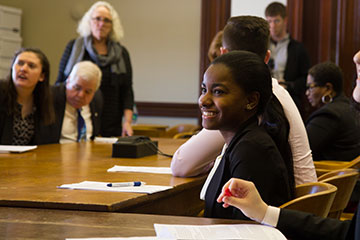 As part of their work, students had visited the Good Neighbors Soup Kitchen, heard about the struggles of local farmers trying to compete with mega-farms, and the interconnection between local farms, community gardens and the emergency food response locations that receive their donations. While visiting social service agencies like Amos House and the East Bay Community Action Program (EBCAP), they learned about the vital role temporary shelter, job training, and food-assistance programs play in many people’s lives. Some administrators even shared stories about how they had depended on programs like SNAP (Supplemental Nutrition Assistance Program) and WIC (Women, Infants, and Children) to support their families before getting back onto their feet.
As part of their work, students had visited the Good Neighbors Soup Kitchen, heard about the struggles of local farmers trying to compete with mega-farms, and the interconnection between local farms, community gardens and the emergency food response locations that receive their donations. While visiting social service agencies like Amos House and the East Bay Community Action Program (EBCAP), they learned about the vital role temporary shelter, job training, and food-assistance programs play in many people’s lives. Some administrators even shared stories about how they had depended on programs like SNAP (Supplemental Nutrition Assistance Program) and WIC (Women, Infants, and Children) to support their families before getting back onto their feet.
“You never know to the left of you or right of you in the grocery store” who might be receiving these critical benefits, said EBCAP Director of Social Services Angela Downing as the students explored the facilities last week. “Remember, the faces of hunger are children.”
To bring home the lesson on what it’s like to live on limited means, professors Becky Spritz and Kerri Warren also had challenged the students earlier in the week to an Iron Chef competition. This experiential learning exercise tasked the students to create a nutritious, appetizing meal to feed a family of four with only $10 (similar to what a family receives through SNAP), from one shopping location and within a few hours.
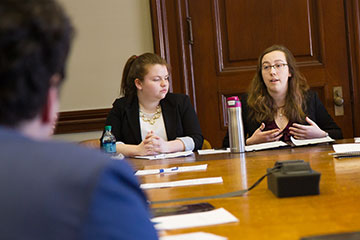 “Our effort was in engaging us and immersing ourselves in what it’s like to be food insecure for us to gain an understanding of how to combat that problem,” Samuel Munhall, a cybersecurity and networking major, told the legislators.
“Our effort was in engaging us and immersing ourselves in what it’s like to be food insecure for us to gain an understanding of how to combat that problem,” Samuel Munhall, a cybersecurity and networking major, told the legislators.
Jessica Jensen, an engineering major, explained their recommendations for improving programs and supporting legislation addressing food insecurity issues, while urging legislators to continue funding critical services and initiatives like EBCAP, Rhode Island’s Health Equity Zones, more affordable housing and access to free or reduced public transportation. Among their ideas, Jensen said the group advocates support of a law to make free breakfast and lunch available to all public-school students in Rhode Island (H 6150) – co-sponsored by one of the legislators who met with the students – as a way to prevent “lunch shaming” and “bullying” among peers, as well as increase access to nutritious food.
Making a Meaningful Community Impact
While this year’s Stay Break was aimed at diving deep into the issues of food insecurity from a public health- and a psychology-focused perspective, Professor Spritz says the course also provided ways for students to apply their knowledge and skills in making a meaningful impact on the local community.
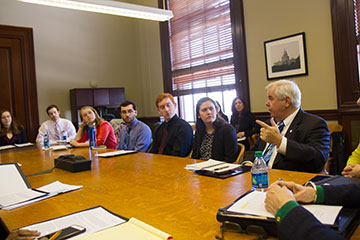 Spritz explained that the course – offered through the Honors Program and Feinstein Community Center for Service Learning and Engagement at RWU – designed many ways for students to learn and hear firsthand what the community’s needs were and then work toward solutions in addressing the issues.
Spritz explained that the course – offered through the Honors Program and Feinstein Community Center for Service Learning and Engagement at RWU – designed many ways for students to learn and hear firsthand what the community’s needs were and then work toward solutions in addressing the issues.
“Starting at Mathewson Street Church was unique because they do the meal prep the night before and the next day, they’re sharing a meal with people who are facing homelessness and poverty,” Spritz said. “It’s not just about feeling good by serving a meal – it’s sitting down and connecting with the human side of it. Then we talked about how that’s just as much of a service as doing the service. At RWU, we approach service as ethical community involvement and driven by the community’s needs.”
For Evan Przyborowski, a cybersecurity and networking major, this experience particularly resonated with him.
“It was gratifying to know we had prepped breakfast the night before and then got to see them enjoy the meal and not even know we were the ones who had done it. They didn’t even know why we were there and you could see they were a little skeptical about a bunch of college students coming in for the [free] breakfast,” Przyborowski said. “We were nervous, too, but just tried to have normal conversations. Eventually, the stigma was pushed to the side and we just talked. I have never experienced things like this before in volunteer work. It was a very powerful experience.”
It was this kind of real-world lesson they hoped to instill in the students, putting a face on the issue as they worked toward a “proposal that we feel could make a real impact,” Spritz said. “We want them to apply their knowledge to make a difference.”
Translating Learning into Policy
As they presented their policy recommendations, the students struck up a lively debate with the state legislators and asked about plans to address the issues. In turn, the legislators informed them of individual and collaborative efforts, and commended the students for their efforts.
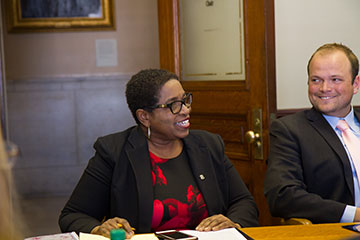 “It is really important to have people making their voices heard, which is why I’m really excited that all of you are engaged in this type of work,” said Rep. Regunberg. “Please keep up this advocacy. It really makes a big difference.”
“It is really important to have people making their voices heard, which is why I’m really excited that all of you are engaged in this type of work,” said Rep. Regunberg. “Please keep up this advocacy. It really makes a big difference.”
When the clanging bell marked the start of the legislative session, the students and professors joined the legislators on the floor of the General Assembly. As special guests, the students were introduced individually by Rep. Donovan who explained their work in “learning about hunger from those who experience it, as well as those who work to support them.”
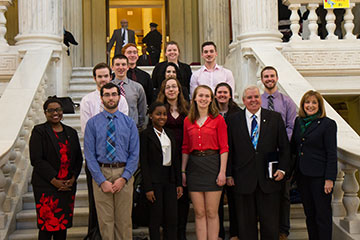 “We hope your week was as inspiring as it was productive,” added Rep. Donovan, praising the students’ efforts while addressing the legislature.
“We hope your week was as inspiring as it was productive,” added Rep. Donovan, praising the students’ efforts while addressing the legislature.
Read "RWU Stay Break Part I: A Real-World Dive into R.I.'s Food Insecurity Issues"
At RWU, we develop Civic Scholars who believe in community-engaged work. That’s why we commit to providing every student an opportunity that empowers them to put their knowledge and skills to the test solving real-world problems and creating meaningful change with community partners. Learn more about the Civic Scholars program and how to help us reach our goal of every student participating in civic scholarship